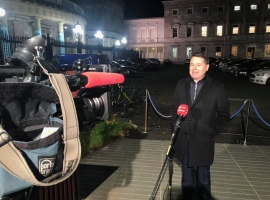
The Central Bank of Ireland has today published its second edition of the 2017 Macro-Financial Review (MFR) (see attached), which provides an overview of the current state of the macro-financial environment in Ireland. Despite a global economic recovery that continues to strengthen, the Review highlights a range of risks to the Irish economy and financial system. The risks identified in the latest MFR include Brexit, disruptions to global trade arrangements, overheating and high levels of indebtedness in both households and firms.
Today’s assessment continues to highlight the threat of overheating in the economy, as Ireland approaches full employment. Infrastructural deficits in transport, communications, and residential property pose a risk to growth by, on one hand, the constraint they impose on growth and, on the other, as the additional expenditure required to address them may add to overheating pressures.
A large share of debt, including mortgage debt, is highlighted as being vulnerable to a rise in increase rates, including policy rates from the European Central Bank. Furthermore, banks’ loan books remain concentrated in property-related lending, leaving banks vulnerable to adverse developments in residential and commercial real estate markets. In the first nine months of 2017, €7.6 billion in new mortgage lending was drawn down, an increase of 16% on the same period in 2016.
Commenting on the research, Deputy Governor at the Central Bank, Sharon Donnery said, "Whilst the recovery of the Irish economy continues to strengthen, the risks are both real and varied. The agreement reached between UK and EU negotiators last week is to be welcomed, but Brexit continues to pose a major risk to the Irish economy given that any final deal is still subject to continued negotiations which will be both significant and complex."
She added, "Without the detail of any final deal, it is prudent that we continue to call out the risks. Sectors such as agri-food and manufactured goods, which are highly dependent on the UK for trade, remain vulnerable. In the absence of a final trade deal, disruption to supply chains is also a possibility, with many firms currently using the UK as a land bridge for transporting goods here. Any change to transport routes or increased border waiting times might mean a knock-on increase in prices for Irish shoppers. Meanwhile, high levels of indebtedness in many Irish firms may deter investment and leave them vulnerable to any economic downturn or unable to raise the finance required to alter business models post-Brexit."
Source: www.businessworld.ie
















